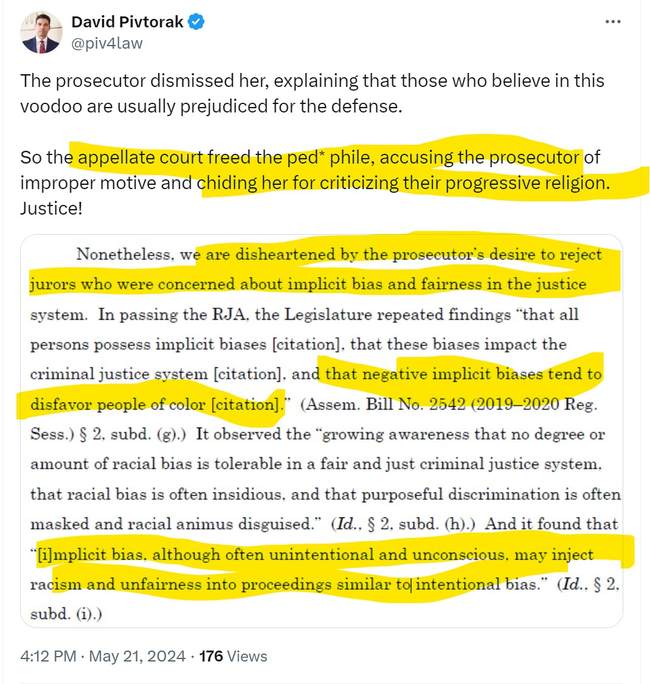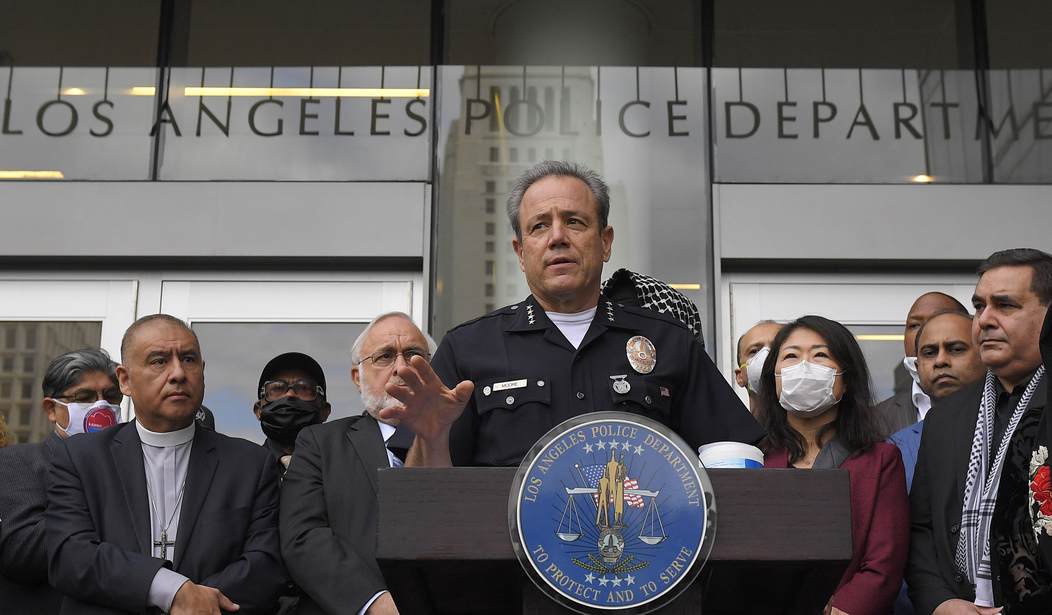In 2020, a law passed the California legislature without any really meaningful review or public comment. 'The Racial Justice Act' was authored by a state rep named Ash Kalra.
...The law prohibits bias based on race, ethnicity, or national origin in charges, convictions, and sentences issued in court. It permits a challenge to a criminal conviction if a judge, attorney, law enforcement officer, expert witness, or juror exhibited bias or animus towards the defendant because of their race, ethnicity, or national origin — or used racially discriminatory language during the trial.
Applicable to cases sentenced after Jan. 1, 2021, the law runs counter to the 1987 Supreme Court decision in McClesky v. Kemp, which rejected the use of statistical disparities in applying the death penalty to prove intentional discrimination required for a constitutional violation.
“Racism affects every aspect of the criminal justice system,” Berkeley Law Dean Erwin Chemerinsky said. “That’s why the Racial Justice Act is so important. We’re trying to deal with racism in charging, convictions, and sentencing. But it’s time to assess the act, to better understand it, and think about how to strengthen it.”
On its surface, it seems like another one of those virtue-signaling social justice warrior pieces of legislation that are destined to really screw things up, but good.
...The Racial Justice Act operationalizes the proposition that every aspect of the criminal-justice system is biased against blacks. But according to the act’s legislative authors, it’s too hard to prove such bias in the case of individual arrests and prosecutions. Therefore, the act does away with the concept of individual fault and individual proof. From now on, statistics about past convictions are sufficient to invalidate a present trial or sentence.
The RJA explicitly repudiates a key Supreme Court precedent that had governed bias challenges in criminal trials. The plaintiff in McCleskey v. Kemp (1987), Warren McCleskey, a black man, was facing the death penalty for murdering a white police officer in Fulton County, Georgia. McCleskey presented a study purportedly showing that killers of all races in Georgia were more likely to be sentenced to death if their victim was white. Blacks who killed whites were at greatest risk of capital punishment. That alleged historical disparity in sentencing invalidated his own death sentence, argued McCleskey. The Court, in a 5–4 decision, disagreed.
Defendants must show that criminal-justice decision-makers were purposefully biased against them, in order to throw out a conviction or a sentence under the Equal Protection clause of the Fourteenth Amendment, the Court ruled. Statistics purporting to show a historical pattern of bias are not enough to support the requisite showing of individual discriminatory purpose against a particular defendant.
Thanks to the RJA, McCleskey no longer governs bias challenges in California. From now on in California, statistics purporting to show a pattern of bias in the past are enough to invalidate a current arrest, criminal charge, or judicial sentence.
In May of last year, a Contra Costa County judge dismissed gang enhancements against four black men in what was seen as the first application of the statute.
In an unprecedented ruling, a Contra Costa County judge ruled that prosecutors have disproportionately charged Black defendants with sentencing enhancements that unfairly target them for life in prison without parole – at about a 40% greater likelihood than non-Black defendants.
Contra Costa County Superior Court Judge David Goldstein made his ruling formal on May 23.
And in doing so, he dismissed gang enhancements against four men under the 2022 California Racial Justice Act authored by Assemblyman Ash Kalra, (D-San Jose), which allows defendants to seek legal relief if racial bias can be proven.
It is the first ruling regarding racial bias in charging decisions in California.
The judge's order clears the way for any Black person who has faced or is facing those charges in Contra Costa County over the past decade to challenge them in court.
What these men were accused and convicted of were truly heinous acts. Real gang banger mayhem and slaughter.
One example in a list of them:
...On August 29, 2020, Daunzhay Young’s luck ran out. A male chased him down a quiet residential street in Antioch in the middle of the day, gun blazing. After Young collapsed, the gunman stood over him and pumped him with additional shots from a semiautomatic pistol. The execution was successful.
Katy bar the door in Contra Costa...
...That closure proved short-lived. In April 2023, a superior court judge in Contra Costa County threw out the life-without-parole sentences previously imposed on the Aspen Way murder defendants, on the ground that the sentencing of black gang members for gang murder in Contra Costa County had historically been “systemically biased.” The defendants did not claim that the legal process against them was unfair. Nevertheless, because allegedly race-based sentencing disparities had occurred in the past in Contra Costa County, the life-without-parole sentences of the Aspen Way killers Eric Windom, Terryonn Pugh, Keyshawn McGee, and Allen Trent were now invalid.
...and the rest of the state isn't far behind.
The Act was upheld by the Second District Court of Appeal last October, and challenges to convictions have been rolling in.
...The law, written by Assembly Member Ash Kalra, D-San Jose, took effect in 2021 and goes further than previous state or federal laws by overturning convictions that were influenced by racial bias or discriminatory language used by anyone in the case — the judge, lawyers for either side, a juror or an expert witness — even if it was unintentional. A follow-up law, also by Kalra, allows the Racial Justice Act to be used to challenge past cases, starting this year with pending death sentences.
In Thursday’s 2-1 ruling, the Second District Court of Appeal in Los Angeles said the Legislature was entitled to decide that a criminal trial influenced by racism was a miscarriage of justice. The dissenting justice said the California Constitution leaves those decisions to judges, not lawmakers, and urged the state Supreme Court to take up the issue.
But, in a new and terrifying development for CA residents, judges are disqualifying other judges for hearing cases because they don't like the cut of that particular judge's jib. Perhaps the prospective jurist is conservative. Questions the "systemic racial bias" narrative.
Well...he's out.
IOW, judges are doing judge shopping for defendants.
In addition to being punished for believing irrefutable data, the disqualification was also based on the fact that the judge "questioned" the existence of systemic racism and implicit bias—two concepts that, ironically, have extremely dubious evidentiary support.
— David Pivtorak (@piv4law) April 25, 2024
/2 pic.twitter.com/4NkQGtGJBV
And it boils down to statistics and damn statistics - whose ya gonna use and what about when you're up against a judge who has his own statistics.?
...Thanks to the RJA, McCleskey no longer governs bias challenges in California. From now on in California, statistics purporting to show a pattern of bias in the past are enough to invalidate a current arrest, criminal charge, or judicial sentence.
...[Prosecutor] McCleary needed to show that the 17 nonblack defendants in the comparison pool who did not receive a life-without-parole sentence had similar criminal histories or had committed murders of equal egregiousness to the 30 black defendants who did receive life-without-parole sentences. Had he shown such similarities, the argument that race explained their different sentences would be plausible. But McCleary did not even try to look at criminal records or the severity of the murders. The judge, however, was willing to accept the unproved assumption that all the gang-murder defendants in the comparison pools engaged in similar conduct and had similar histories. He would not accept the proposition, he wrote, that “Black defendants charged with gang murder [have], on average, worse criminal records than non-Black defendants, committed the crimes in crueler fashion, or committed more provable crimes,” absent evidence to the contrary. The Contra Costa County district attorney did not provide such evidence, having not even attempted the labor-intensive analysis of the data that would have been necessary.
You won't be shocked to learn a UC Irvine professor was the "statistician" behind the successful challenge in the Contra Costa case.
One county prosecutor was so bent out of shape after the judgment, that he commissioned his own study which found:
...It turned out that the black gang members in the life-without-parole pool had committed more heinous murders than the nonblack gang members, as measured by the special circumstances in their cases...
But, oh, well. And now, besides the original four in the case, the thirty life-without-parole black convicts in the historical pool used for the statistics can now all sue to "reopen their sentences."
Lucky them if they get one of these judges, and it's not like they aren't a dime a dozen in CA.
All this without discussing a single word about the impact on an already overwhelmed CA justice system.
Just a few days ago, a pedophile sentenced to 15 years was released by a judge because the prosecutor at his trial had dismissed a juror who had expressed belief in racial bias and animus. Jurors with such beliefs, understandably, are usually sympathetic to the defense, so the prosecutor let the woman go from the jury pool.
The appeals court didn't like that. Guess what they did next?

Soros DAs are thrilled. Disgraced former DA Chesa Boudin is holding seminars on the Act at Berkeley.
CA residents?
As Norm Macdonald might have said, 'Hope they like crime!'
— GammonBot (@mingmingmung) May 21, 2024
I mean, do they have any loins left to gird?







Join the conversation as a VIP Member